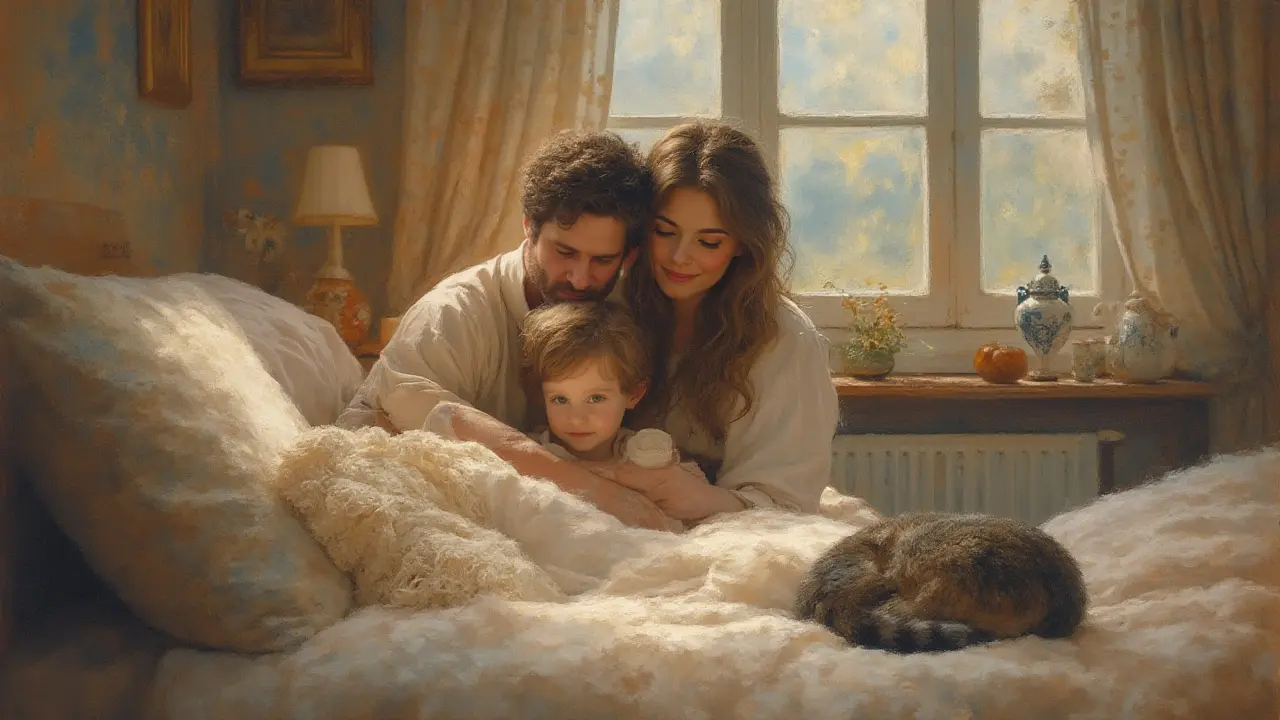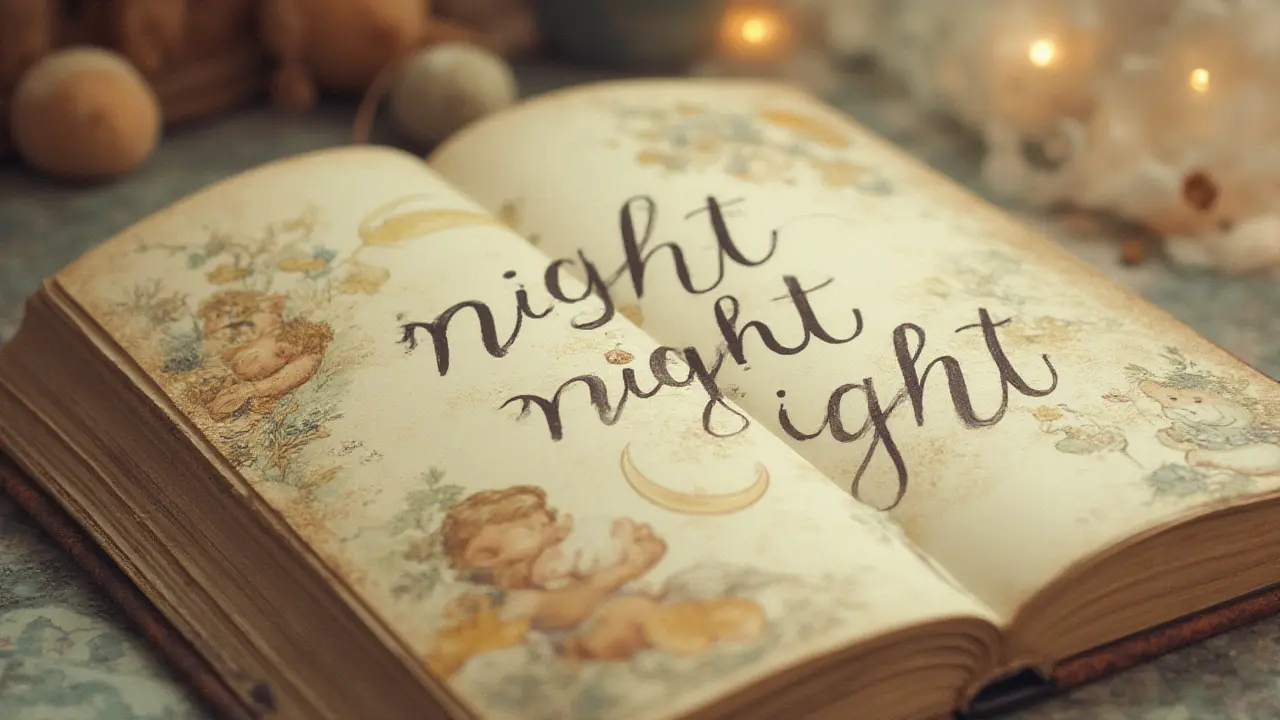
Key Points
- 'Night night' is an affectionate way to say goodnight, often used with children or loved ones.
- It reflects care, warmth, and sometimes nostalgia, stretching far beyond a basic farewell.
- While common in English-speaking countries, its use and tone can change depending on who says it and where.
- People use 'night night' in texting, social media, and real-life conversations, sometimes even playfully among adults.
- Learning how, when, and whom to say it to can add a lovely, personal touch to your evening routine.
Direct Answer – What Does Night Night Mean?
If you’re just after a quick answer, here it is: 'Night night' is a sweet, informal way to say goodnight, especially to kids, close friends, or partners. It’s softer and more loving than a straight 'goodnight', often hinting at affection, reassurance, or even playfulness. You’ll spot it at bedtime, in phone calls right before sleep, and sprinkled through text messages with a little heart or kiss emoji. British parents—myself included—almost instinctively use it with little ones, and let’s be honest, it works like a charm for a peaceful bedtime.
Comprehensive Guide to Night Night – Why This Tiny Phrase Matters
There’s something about bedtime rituals that really stick with you. Those soft, sing-song 'night nights' your mum or dad whispered before turning off the light? They don’t just fade away. Even as adults, we crave a gentle end to the day—a sign-off that everything’s safe and sound. 'Night night' fits perfectly, packed with comfort in just two syllables. It’s like a verbal cuddle: something you'd say as you tuck in your child or give your partner’s hand a goodnight squeeze.
It’s not just for kids either. Londoners might use 'night night' casually between close mates after a few pints, or text it as a cheeky goodnight to a crush—sometimes followed by a wink or moon emoji. When I first started dating Harrison, 'night night' popped up in our late-night conversations. There was always that dash of flirtation, and sometimes, a reminder that someone was thinking of you right before sleep.
Night night meaning also stretches into pop culture. Think of the classic children’s book 'Goodnight Moon', where every object gets a loving sign-off. Or how nursery school teachers rally the class with gentle phrases to help them wind down. Even on British telly, bedtime shows end with characters waving and cooing a gentle 'night night!', almost like they’re tucking in the viewers at home.
There’s evidence that bedtime routines—special phrases included—help with emotional regulation and better sleep, especially for children. Psychologists say repetitive, soothing actions (like saying 'night night') can signal safety and closure, sending the brain all those 'it’s okay to wind down now' signals. I saw it first-hand with my siblings: a rushed 'goodnight' was fine, but a warm 'night night' (especially accompanied by a quick story or hug) meant fewer monsters under the bed and more actual sleep.
In adult life, the habit hangs around—although sometimes more ironically. 'Night night' becomes a playful way to tease your friends, or a sincere way to end an emotional late-night chat. Even when texts are flying back and forth at midnight, a 'night night' message marks that pause—a break before tomorrow spins up again.
Definition and Context of Night Night – Where, Who, and How
So, where did 'night night' come from? Let’s trace it back. Double-word phrases like this—think 'bye-bye', 'choo-choo', 'pee-pee'—have deep roots in English, designed to be easy for little ones to say and remember. 'Night night' rolls off even a toddler’s tongue, and parents love repeating gentle sounds to help children feel safe. It falls under the linguistic category called reduplication, which just means repeating a sound or word to make it easier or friendlier. We humans love a bit of repetition, don’t we?
The phrase took off in the late 19th and early 20th centuries, showing up in children’s rhymes and bedtime rituals. 'Goodnight' on its own felt a bit proper. 'Night night' softened things up and added warmth. British families have kept the tradition strong. Even if you pop into a London nursery, you’ll hear clusters of toddlers cooing 'night night' as they’re bundled off to nap. Teachers and caregivers say it’s a way to build trust—showing kids that bedtime is safe, not scary.
But who actually says it? Most often, parents to young children. But plenty of adults use it with people they feel close to—siblings, partners, roommates, or even pets. Some friends have made it their 'thing' after late-night movies or group chats. You’ll find variations everywhere: some people say 'nighty night', 'night-night', or jazz things up with 'nite nite'. And on social media? There’s a whole world of TikTokers and Instagrammers signing off with a casual 'night night guys', sometimes complete with a silly filter or sleepy dog photo.
Location-wise, it’s most common in the UK, Australia, and the US—but really, anywhere English is spoken, you’ll probably find someone using it. Even in big cities like London, people use it at the ends of WhatsApp threads, family Zooms, or as a cheeky end to a night out. It’s a way of saying, 'rest easy—you’re thought of and cared for.'
When should you use 'night night'? Stick to close, informal relationships, or playful moments between friends. Avoid it in business settings (unless you want to give your boss a shock). Use it with your children, your partner, or that mate who always needs an extra nudge to go to bed on time.
Benefits of Saying Night Night – More Than Just Words
Sure, 'night night' is cute. But it’s also more powerful than you might think. First, there’s the emotional impact: it’s a sign you care. Something about those repeated words triggers a sense of safety, and studies prove that regular bedtime routines—including loving phrases—help kids fall asleep faster and wake fewer times during the night. Child psychologists in the UK point out that children with strong bedtime rituals tend to have better overall emotional health, feeling more secure and loved. That little 'night night' can do wonders.
Now, adults aren’t immune to a bit of comfort, are we? Even Harrison, out of habit, will mumble 'night night' on sleepier evenings if I’m heading up early. The phrase carries those childhood feelings into grown-up life, quietly reminding us that it’s okay to wind down and switch off the noise for a while. If your partner’s had a rough day, or your friend is feeling down, ending the night with 'night night' can be a low-key way to offer support without going overboard.
In relationships, saying 'night night' adds a soft edge to routine. Experts like Dr. Sue Johnson, who’s written loads about attachment and love languages, highlight that small rituals—like a shared phrase at bedtime—build emotional bonds and a sense of intimacy. Anyone who’s long-distanced a relationship knows that the last message of the night has weight. Swapping 'night night' memes, gifs, or selfies can be the digital version of tucking each other in.
And you can get creative. Some families turn 'night night' into a full bedtime ritual, complete with secret handshakes, songs, or tickle attacks. At home in London, we still say 'night night' as a signal to turn off the phones and share one last hug, before forgetting about alarms and work, just for a few hours. It's silly, but it works.
Plus, 'night night' is short—easy to text, easy to say, hard to mess up. That’s why it works for all ages and even gets a laugh in office WhatsApp groups (when your workmate is the first to call it a night at a pub crawl). The phrase has this chameleon quality, able to fit both childish and cheeky moods. The simplicity is what makes it stick.
Types of Night Night Available in London – From Classic to Quirky
Don’t laugh—there really are different ways to use or experience 'night night' in a city like London. As someone raising a family here, I’ve seen just about every variation:
- Traditional Bedtime Rituals. The classic: a whispered 'night night' just before the lights go out, maybe with a story, song, or teddy bear. Most common in family homes and nurseries.
- Bedtime Media Sign-Offs. London children’s TV still wraps up with a 'night night' from presenters or puppets. Shows like 'In the Night Garden' still send kids off to sleep this way.
- Text and Social Media Version. Messaging apps, group chats, and Instagram stories fill up with 'night night' (and its emoji-laden friends) after late-night catch-ups or parties.
- Cheeky Adult Spin. Pub mates or partners use 'night night' as a running joke, especially if someone’s bowing out early or having a sleepy moment on a night bus. If you’ve ever had someone snap a photo of you dozing under a coat, you’ll know how this goes.
- Pet Talk. More Londoners now treat their dogs or cats to a special bedtime send-off—I’ve even seen cocker spaniels get tucked in with a dramatic 'night night' on TikTok.
- ‘Night Night’ Products and Merch. It’s even splashed across pyjamas, children’s books, mugs, and bedtime sprays in shops like Marks & Spencer and John Lewis.
You might even find immersive experiences themed around bedtime in places like the Museum of Childhood, or family events at the Southbank Centre with lullaby singalongs—each one wrapping up with a big 'night night' to all the little guests. The phrase seems to draw a clear line between the wildness of the day and the calm of sleep—something Londoners, young and old, can use.

How to Find 'Night Night' Rituals and Recommendations in London
Looking for the best real-world 'night night' moments in London? The good stuff usually happens at home, but if you want to spice up your routine, here are a few ideas.
- Bedtime Theatre and Story Events. Venues like the Unicorn Theatre or Discover Children’s Story Centre host evening storytimes for kids, ending with quiet time and a cheery 'night night'. Booking ahead is smart for weekend events.
- Family-Friendly Hotels. Some London hotels, especially in Knightsbridge and Covent Garden, offer kids’ turndown services with 'night night' notes, milk, and cookies. It’s a sweet touch for family getaways.
- John Lewis and High Street Shops. For merchandise, simple bedtime cards, or gift sets with a 'night night' theme, you’ll find options in the Children’s section.
- Online Bedtime Resources. Sites like NightZookeeper and CBeebies Storytime app offer digital stories ending with a gentle 'night night'. Handy when your voice is gone or your kids ask for 'just one more'.
- Pet-Friendly Cafés. Bringing your furry friend to a pet café? Ask if they do special send-offs for pet sleepovers. Some places let you leave a note for your dog’s overnight stay signed with a 'night night'!
Here’s a quick table with ideas on where to catch a 'night night' moment in London:
| Type of Experience | Location Example | Highlights |
|---|---|---|
| Storytime Events | Unicorn Theatre | Evening kid’s events, lights-down 'night night' rituals |
| Hotel Turndowns | Family Hotels (e.g. Knightsbridge) | Milk, cookies, handwritten 'night night' notes |
| Media/Apps | CBeebies Storytime | Interactive stories, soft audio sign-offs |
| Pet Sleepovers | Pet Cafés | Bedtime routines for pets, fun for the whole family |
| Retail & Gifts | John Lewis | Pyjamas, books, cards with 'night night' slogans |
What to Expect When You Start Using 'Night Night' – Social and Emotional Reactions
So, what actually happens if you swap your regular 'goodnight' for a 'night night'? It might feel a bit odd at first—especially if you haven’t said it since you were a kid—but give it a try! You’ll probably notice three things:
- Warm Fuzzies. Whether it’s your child, partner, or a sleepy mate, 'night night' has a way of softening the end of a day. Less abrupt, more caring. Lots of feedback loops from parents and friends say it creates a nicer, calmer bedtime.
- Emotional Connection. Studies out of the University of Warwick show that small bedtime rituals—especially with kids—help build attachment and trust. Language is part of that signal. That extra moment to say 'night night' gets remembered.
- Maybe Some Giggles. When adults use 'night night', there’s nearly always a laugh (and sometimes an eye roll). In group chats, it’s used sarcastically or sweetly—sometimes both at once.
For young children, particularly, saying 'night night' can slot them into a familiar pattern: bath, pyjamas, teeth, story, lights out, 'night night'. It’s the punctuation mark at the end of a story, the glue that holds the evening together. For anxious sleepers, the predictability is calming—just one reason child therapists recommend it alongside other relaxing bedtime routines like lavender diffusers or soft music.
With older kids and adults, you may spark a bit of nostalgia—reminding them of childhood. Some Londoners admit they still text their mum or gran a quick 'night night' if they’ve had a rough day, or if they want a little extra reassurance across the miles.
If you’re thinking about slotting it into your personal routine, start at bedtime. Make it your official family sign-off, your pet’s cue for the final biscuit, or just your private way to end stressful days on a softer note. There’s no wrong way to do it.
Pricing and Practical Tips for Adding 'Night Night' to Your Life
No one ever charged me for saying 'night night'! But if you're aiming to turn bedtime into more of a production—think story events or fancy hotel routines—expect a range. Children’s theatre tickets in London run about £9-£15. Hotel add-ons like turndown gifts can be packaged or included if you book family suites. John Lewis offers bedtime-themed books and pyjamas from around £10 to £30. Pet sleepover extras might add £5 a night for bedtime routines and photo updates.
Here’s a fast cheat-sheet on booking and pricing, London style:
- Storytime events: Check children’s venues for evening event tickets. Pre-booking is safest, especially for weekend shows.
- Hotels: Ask about kids’ or family packages when you reserve your room. Some include themed bedtime extras.
- Shops/Online: Look for 'night night' merch year-round, but you’ll find the cutest stuff around Christmas or Easter.
- Pet cafés: Book in advance for sleepovers or treats. Special 'night night' extras are limited (and adorable—I promise).
Safety Tips – Using 'Night Night' the Right Way
Saying 'night night' is low-risk territory, but here are a few common-sense tips to avoid accidental awkwardness:
- Use it in personal, familiar situations—friends, family, partners, or pets.
- Avoid it in professional emails, customer service chats, or with new acquaintances (unless you’re close).
- If using with children, try to stick to regular routines so it signals predictability and comfort.
- For adults, don’t be surprised if there’s a little teasing. Take it in stride—it’s all part of the charm!
There's nothing specific to worry about, but if bedtime phrases like 'night night' are used as a joke or sarcastically, make sure the mood is right—nobody likes to feel patronised. For kids, consistency and a gentle tone work best. If you’re in a group chat, set the tone early so everyone shares the fun.
Comparison Table: Night Night vs. Goodnight in London
| Aspect | 'Night Night' | 'Goodnight' |
|---|---|---|
| Tone | Warm, casual, affectionate | Neutral, sometimes formal |
| Common Use | Children, family, close friends | Anyone—friends, colleagues, formal |
| Setting | Home, chat, informal texts | Home, work, public settings |
| Emotional Impact | Nostalgic, soothing, playful | Polite, straightforward |
| When to Use | Bedtime rituals, family chats | Any time, anyone, more formal |
FAQ: Your Questions About Night Night Answered
- Is 'night night' just for children? Not at all! While it’s common with kids, adults use it for flirting, friendship, or even as private jokes.
- Can I text 'night night' to my partner? Definitely. It’s cute, affectionate, and adds a soft touch to your chats.
- Why do people double the word in 'night night'? Linguists call this reduplication. It makes the phrase easier and more comforting for kids.
- Are there similar phrases in other countries? Yes—French uses 'bonne nuit', sometimes with similar repeated phrases for kids. In Spanish, 'buenas noches' may be softened with pet names.
- Does 'night night' help with sleep? For many children, yes. Routines lower stress and send a clear bedtime signal, according to research from UK sleep clinics.

Ready for a Better Bedtime?
You don’t need bells and whistles—just add a loving 'night night' at the end of your evening. Try it out this week. You might bring a little more warmth, comfort, or fun to your nightly routine—no matter your age. Sweet dreams!






